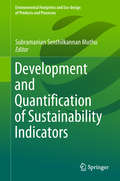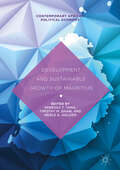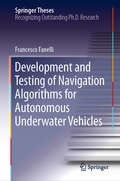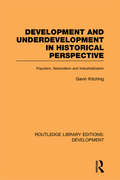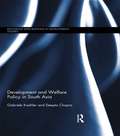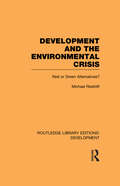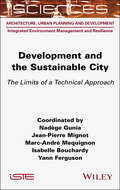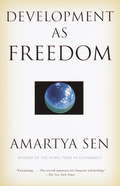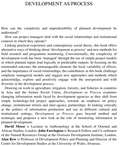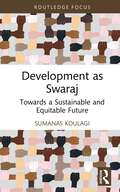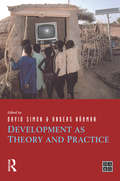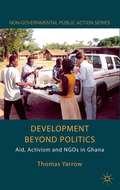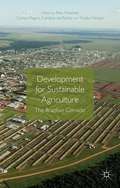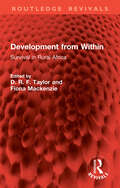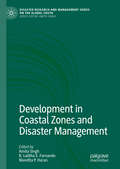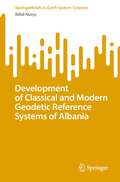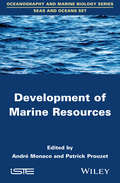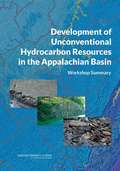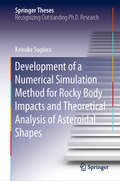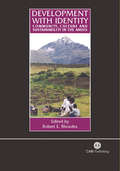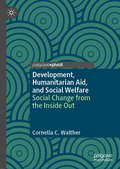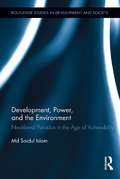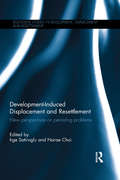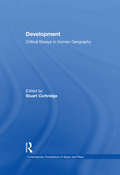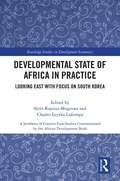- Table View
- List View
Development and Quantification of Sustainability Indicators (Environmental Footprints And Eco-design Of Products And Processes)
by Subramanian Senthilkannan MuthuThis book highlights various methods for quantifying sustainability indicators using different indices. To date, numerous sustainability indicators encompassing either all three pillars (economic, environmental and social) or individual or joint indicators (e.g. environmental and social) have been developed and quantified. In addition to commonly developed indicators, which can be utilized for any industrial sector, sector-specific sustainability indicators are frequently used. Behind each indicator developed, there is a unique scientific model, method or assessment technique. This book explores and elaborates on such indicators, and on associated details such as the concept, development methodology, assessment technique, and applications of each indicator.
Development and Sustainable Growth of Mauritius (Contemporary African Political Economy)
by Timothy M. Shaw Vanessa T. Tang Merle G. HoldenThis edited volume analyzes the Mauritius economy and highlights what conditions and policies have contributed to the development of the country. The project gives a historical and economic analysis of Mauritius and provides comparative approaches looking at other developing states in Africa and Asia. This book is intended for a broad audience, consisting of not only economists with quantitative expertise but also other social scientists, policymakers and scholars interested in the intellectually fascinating exploration of Mauritius’s rapid rise and sustained growth performance.
Development and Testing of Navigation Algorithms for Autonomous Underwater Vehicles (Springer Theses)
by Francesco FanelliThis book focuses on pose estimation algorithms for Autonomous Underwater Vehicles (AUVs). After introducing readers to the state of the art, it describes a joint endeavor involving attitude and position estimation, and details the development of a nonlinear attitude observer that employs inertial and magnetic field data and is suitable for underwater use. In turn, it shows how the estimated attitude constitutes an essential type of input for UKF-based position estimators that combine position, depth, and velocity measurements. The book discusses the possibility of including real-time estimates of sea currents in the developed estimators, and highlights simulations that combine real-world navigation data and experimental test campaigns to evaluate the performance of the resulting solutions. In addition to proposing novel algorithms for estimating the attitudes and positions of AUVs using low-cost sensors and taking into account magnetic disturbances and ocean currents, the book provides readers with extensive information and a source of inspiration for the further development and testing of navigation algorithms for AUVs.
Development and Underdevelopment in Historical Perspective: Populism, Nationalism and Industrialisation (Routledge Library Editions: Development)
by Gavin KitchingHow do the intellectual origins and historical background of western and other theories of development affect their relevance to contemporary Third-World conditions? This is the central question behind Gavin Kitching’s examination of ‘development studies’, first published in 1982, from its origins in the late 1940s through to the contemporary era. While presenting the contemporary ‘radical orthodoxy’ of development studies, Kitching argues that these theories are continuations of much older traditions of populist and neo-populist thought.
Development and Welfare Policy in South Asia (Routledge Explorations in Development Studies)
by Deepta Chopra Gabriele KoehlerThis book sheds light on social policies in six South Asian countries introduced between 2003 and 2013, examining the ways in which these policies have come about, and what this reflects about the nature of the state in each of these countries. It offers a detailed analysis of the nature of these policies introduced in recent years in Bangladesh, India, Maldives, Nepal, Pakistan and Sri Lanka, and illustrates the similarities and differences in policy approaches amongst the six countries. Through this analysis, the book explores the thesis of whether there is a particular type of ‘developmental welfare state’ that can be observed across South Asia. The focus is on social policies or policies designed to address poverty and deliver welfare at the level of programming and design, i.e. the stated intent of these policies. The book also presents an analysis of the fiscal space available in each of the six countries, thereby drawing conclusions about the financial feasibility of a ‘developmental welfare state’ model in the region. This comprehensive book uniquely explores critical aspects of policy debates on a possible move from welfare to ‘rights’. It introduces students and researchers in development studies, social policy and South Asian studies to innovative welfare programmes in South Asia and gives a new perspective on the nature and patterns of welfare in South Asia with the view of tackling inequality and promoting well-being.
Development and the Environmental Crisis: Red or Green Alternatives (Routledge Library Editions: Development)
by Michael RedcliftFirst published in 1984, Michael Redclift’s book makes the global environmental crisis a central concern of political economy and its structural causes a central concern of environmentalism. Michael Redclift argues that a close analysis of the environmental crisis in the South reveals the importance of the share of resources obtained by different social groups. The development strategies based on the experiences and interests of Western capitalist countries fail to recognise that environmental degradation in the South is a product of inequalities in both global and local economic relations and cannot be solved simply by applying solutions borrowed from environmentalism in the North. The key to understanding the South’s environmental problems lies in the recognition that structural processes – markets, technology, state intervention – are also a determining influence upon the way natural resources are used. Through his review of Europe’s Green Movement, contemporary breakthroughs in biotechnology and information systems and recent feminist discourse, Michael Redclift has enlarged the compass of the environmental debate and produced a book which should serve as a benchmark in future discussions of development and the environment. It will be of importance to students in a range of disciplines, within development studies, geography, ecology and the social sciences.
Development and the Sustainable City: The Limits of a Technical Approach (ISTE Consignment)
by Nadège Gunia Jean-Pierre Mignot Marc-André Mequignon Isabelle Bouchardy Yann FergusonThis book examines the city and its rapid growth, as well as the sustainability issues it poses, in several ways. First, there is a critical approach to development, as expressed by the concept of sustainable development. The city, as a complex system, primarily refers to questions of sustainability performance, which we believe to be capable of resolving problems and difficulties, even when viewed from a local perspective, and therefore from the point of view of the areas in which it must act. Lastly, the issue of sustainability cannot be addressed without contemplating and concluding how acceptable it is to the populations concerned. All challenges raised by the urban character of the city are therefore linked to the more general question of how to define the concept of sustainable development and the sustainable city as a key area of concern.
Development as Freedom
by Amartya SenBy the winner of the 1988 Nobel Prize in Economics, an essential and paradigm-altering framework for understanding economic development--for both rich and poor--in the twenty-first century. Freedom, Sen argues, is both the end and most efficient means of sustaining economic life and the key to securing the general welfare of the world's entire population. Releasing the idea of individual freedom from association with any particular historical, intellectual, political, or religious tradition, Sen clearly demonstrates its current applicability and possibilities. In the new global economy, where, despite unprecedented increases in overall opulence, the contemporary world denies elementary freedoms to vast numbers--perhaps even the majority of people--he concludes, it is still possible to practically and optimistically restain a sense of social accountability. Development as Freedom is essential reading.
Development as Process: Concepts and Methods for Working with Complexity (Routledge Research/ODI Development Policy Studies #No.2)
by David Mosse Alan Rew John FarringtonProcess" approaches to economic and social development appear to be more flexible and offer greater prospects of success than traditional "project" methods. Development as Process addresses the questions raised by the different natures of the two approaches. The authors examine development projects through experience in water resources development in India and in organizational learning by a Bangladeshi NGO. Inter-agency contexts are examined in the setting of an aquaculture project in Bangladesh and in the setting of agriculture and natural resources development in Rajisthan, India. Finally, the role of process monitoring is explained in the context of policy reform, with illustrations from forestry in India and land reform in Russia.
Development as Swaraj: Towards a Sustainable and Equitable Future (Routledge Studies in Development Economics)
by Sumanas KoulagiThis book offers an in-depth insight into the Indian concept of swaraj--self-rule--both in theory and practice and posits it within the larger context of development. It opens by discussing the limitations of prevailing sustainable development paradigm as well as other heterodox development paradigms in achieving a sustainable and equitable future. Further, it constructs development theory around the idea of swaraj, based on the writings of M K Gandhi and J C Kumarappa. The swaraj development vision weaves in the morality of the greatest good of all, political decentralisation, and economic self-sufficiency as important elements to achieve an exploitation-free social order that ensures more control for individuals over their lives. It reveals sustainability and equality as inherent features of such a non-violent social order. The book then provides an introduction to the khadi--handspun and handwoven textile--sector, which is taken as a case study to demonstrate the swaraj development approach. The use of this sector helps readers to get a snapshot of the efforts that have been made since the time of Gandhi and Kumarappa towards the attainment of swaraj. Importantly, the khadi section highlights the method of translating theory into practice based on the unique three-pronged approach of the swaraj development paradigm. By showcasing how to establish swaraj within the khadi sector, the author offers insights into how it can be replicated for attaining a sustainable and equitable world. The book will appeal to scholars and researchers in the fields of Gandhian studies and development studies.
Development as Theory and Practice: Current Perspectives on Development and Development Co-operation (Developing Areas Research Group)
by David Simon Anders NThe first book in the DARG series,Development as Theory and Practice provides the only student textbook which addresses broad contemporary perspectives and debates on development and development cooperation. It introduces the notions of development and what it means from different perspectives i.e. from the point of view of academics in the wake of the New World Order, regional specialists detached from the field, Third World students of development, and development practitioners. The second part of the book focuses on development aid and examines the changing relationship between donors and recipients, and the effects of these relationships on the wider communities in these countries, and current re-evaluations of aid in principle and practice. Development as Theory and Practice is an ideal course text for advanced undergraduate and postgraduate courses in development aid as part of degree programmes in Development Studies, Geography, Politics, Sociology and Anthropology. It will also be of interest to researchers and development practitioners and professionals.
Development beyond Politics
by Thomas YarrowIs 'development' the answer for positive social change or a cynical western strategy for perpetuating inequality? Moving beyond an increasingly entrenched debate about the role of NGOs, this book reveals the practices and social relations through which ideas of development are concretely enacted.
Development for Sustainable Agriculture: The Brazilian Cerrado
by Akio Hosono Carlos Magno Campos da Rocha Yutaka HongoSince the mid-1970s, the tropical savanna, known as Cerrado, has been transformed into one of the world's largest grain-growing regions. This book explores how and by what Brazil achieved inclusive and sustainable growth in the Cerrado.
Development from Within: Survival in Rural Africa (Routledge Revivals)
by Fiona Mackenzie D. R. F. TaylorThe decade of 1980s was one of crisis for Africa. Neither African governments nor development agencies made a significant impact on the quality of life of rural people. The enormous range of contexts in Africa — social, economic, political, cultural, and environmental — limits the value of the search for universal solutions to endemic problems. First published in 1992, Development from Within examines an alternative framework, arguing for flexibility and specificity. The authors use case studies to explore the complex social relationships of power — from the household to the state. They argue for the knowledge and skill of African people and illustrate the diverse means by which men and women in rural Africa struggle to survive.This book will be a beneficial read for students and researchers of African studies, development studies, economics, and sociology.
Development in Coastal Zones and Disaster Management (Disaster Research and Management Series on the Global South)
by Amita Singh Nivedita P. Haran R. Lalitha. S. FernandoIn the last two decades, coastal regions have relatively endured some of the fiercest oceanic and geophysical disasters than the earlier decades. Yet, disaster management governance fails to match the human, nonhuman and environmental calamity which is unfolding in its most frequent and unpredictable pattern. Between the Asian Tsunami of 2004 to the devastating Chennai and Kerala floods of 2018 the socio-industrial-livelihood impact alerts governments towards a greater and more serious compliance to laws for coastal conservation. The United Nations Office for Disaster Risk Reduction (UNDRR) in 2018 had shocking statistics to share as the deaths and damages related to only Tsunami disaster at the coasts to 251,770 and US$280 billions respectively in the last 20 years (1998-2017) as compared to 998 and US$ 2.7 billion in the previous 20 years (1978-1997). Coastal conservation is no more a question of casual governance but has become a need for survival. The region of South Asia which ranks much higher in its vulnerability, weak resilience and relatively undersupplied governance structures ought to take this responsibility on a priority. The spirit of Hyogu Declaration and the Sendai Framework for Action suggests preparedness and resilience building as key approach areas in coastal governance. The book is incomparable in its holistic and transdisciplinary social science based approach to disaster management which links conservation of marine flora and fauna, ecosystems and land management with decision making processes and coastal regulations. These grass root findings from the subcontinent are substantiated by a section on the most powerful court battle on the Kerala Floods as a guideline for readers to discerningly identify an ‘Act of God’ often used as a veil to hide lack of preparedness, apathy and political greed. This book becomes indispensable reading for anyone involved in research, administration or any level of decision making for the mitigation and prevention of disasters.
Development of Classical and Modern Geodetic Reference Systems of Albania (SpringerBriefs in Earth System Sciences)
by Bilbil NurçeThis book addresses the problems of mathematical relations between global and classical coordinate references from the practical applications point of view. It presents a large cartographic and numerical information set, which provides great values for practical and academical use based on the classical Albanian coordinative reference (ALB1986/ALB1987). This information is reflected from the positional point of view in the new modern Albanian satellite reference ALBPOS (Albanian Positioning System) or ALBCORS (Albanian Continuous Operation Reference Stations System). The main purpose of this Monograph is to summarize coordinative references applied in Albania in different periods, both classical and modern. Relevant transformation models between traditional/classical reference ALB1986 / ALB1987 and GNSS satellite reference are presented. The book furthermore recommends the mathematical models of the relationship in plan and height, between the Albanian classical reference and the global/European coordinate references (ITRF, EUREF). It serves to professionals involved in fundamental geodetic works as well as all working with GNSS or developing GIS applications.
Development of Marine Resources
by Patrick Prouzet André MonacoMarine resources and their exploitation, recovery and economic networks they generate are here from the perspective now inevitable growing environmental constraints, policy management and technical innovation.A historical perspective shows that Ocean and its adjacent seas at all times, allowed coastal communities to adapt to a very volatile environment through many technological changes.The recent development of marine biotechnology , the discovery of a great pharmacopoeia especially in reef environments , the development of marine renewables , are examples which show that man can develop through these new technologies property and services of the ocean.But this development resources under pressure of global change requires not only taking into account technical, but also social and political. This is the price that the analysis of maritime activities will assess the sustainability and development of various economic sectors and coastal populations, faced with the objectives of a "blue growth" associated with a return to the "good state "of the marine environment
Development of Unconventional Hydrocarbon Resources in the Appalachian Basin
by Anne Linn"Development of Unconventional Hydrocarbon Resources in the Appalachian Basin" is the summary of a workshop convened by the National Research Council to examine the geology and unconventional hydrocarbon resources of the Appalachian Basin; technical methods for producing unconventional hydrocarbons and disposing of wastewater; the potential effects of production on the environment; relevant policies and regulations; and priorities for future scientific and engineering research. Workshop presentations by experts in the fields of geosciences and engineering examined the numerous geoscientific aspects of hydrocarbon development from unconventional resources, including natural gas, oil, and natural gas liquids. Shale gas is the fastest growing source of U. S. natural gas. Most of the oil and gas produced in the United States comes from conventional reservoirs in which hydrocarbons have accumulated in discrete structural or stratigraphic traps below relatively impermeable rock and above a well-defined hydrocarbon-water interface. However, a growing fraction comes from unconventional reservoirs - geographically extensive accumulations of hydrocarbons held in low-permeability rock with diffuse boundaries and no obvious traps or hydrocarbon-water contacts. In the Appalachian Basin, shale gas development is proceeding in Ohio, Pennsylvania, and West Virginia, while New York and Maryland have commissioned studies to assess potential impacts. "Development of Unconventional Hydrocarbon Resources in the Appalachian Basin" focuses on the main hydrocarbon-bearing geologic formations in and around the Appalachian Basin, including the Marcellus, Utica, and Devonian shales, and their estimated resources, current production levels, and projected output. This report examines the potential effects on surface water and groundwater quality and quantity; potential effects on landscapes, including soil and living organisms, and other environmental systems; and technical and engineering processes for exploration and production.
Development of a Numerical Simulation Method for Rocky Body Impacts and Theoretical Analysis of Asteroidal Shapes (Springer Theses)
by Keisuke SugiuraThis book describes numerical simulations of collisions between asteroids, based on a unique numerical code developed by the author. The code accurately solves the elastic dynamic equations and describes the effects of fracture and friction, which makes it possible to investigate the shapes of impact outcomes produced by asteroid collisions and subsequent gravitational accumulation of fragments.The author parallelizes the code with high parallelization efficiency; accordingly, it can be used to conduct high-resolution simulations with the aid of supercomputers and clarify the shapes of small remnants produced through the catastrophic destruction of asteroids. The author demonstrates that flat asteroids can only be produced by impacts involving objects with similar mass and low velocity, which suggests that the flat asteroids in our solar system were created in the planet formation era and have kept their shapes until today. The author also shows that asteroid collisions under certain conditions can produce the extremely elongated shape of an interstellar minor body, 1I/‘Oumuamua. In brief, the book offers a comprehensive investigation of asteroid impacts and shapes, making it a uniquely valuable resource.
Development with Identity: Community, Culture, and Sustainability in the Andes
by Robert E. RhoadesThroughout Latin America, indigenous peoples are demanding that development must address local priorities, including ethnic identity. Simultaneously, sustainability scientists need to conduct place-based research on the interaction between environment and society that will have global relevance. This book reports on a 6 year interdisciplinary research project on natural resource management in Cotacachi, Ecuador, where scientists and indigenous groups learned to seek common ground. The book discusses how local people and the environment have engaged each other over time to create contemporary Andean landscapes. It also explores human-environment interaction in relation to biodiversity, soils and water, and equitable development. This book will be of significant interest to sociologists, anthropologists, economists and sustainability scientists researching environment and agriculture in rural communities.
Development, Humanitarian Aid, and Social Welfare: Social Change from the Inside Out
by Cornelia C. WaltherThis book examines how human behavior is shaped by our aspirations, emotions, thoughts and sensations, and conversely, how the experiences that result from our behavior impact ourselves, others and the planet. Based on an analysis of the constant interplay between these four layers, it offers practical solutions to systematically induce sustainable social change dynamics. It shows why change, in addition to economic and political transformation at the macro level, begins with mind-shifts at the micro level. Hereby it establishes the missing link between investments in personal empowerment and collective welfare. A novel theoretical paradigm is the foundation of this book, which is anchored in the perspective of an ongoing ‘body-mind-heart-soul connection.’ Based on the premise that an equitable society is to the benefit of everyone, it is argued that efforts made for others have benefits at three levels – for the individual who acts, the one who has been acted for and for society.
Development, Power, and the Environment: Neoliberal Paradox in the Age of Vulnerability (Routledge Studies in Development and Society)
by Md Saidul IslamUnmasking the neoliberal paradox, this book provides a robust conceptual and theoretical synthesis of development, power and the environment. With seven case studies on global challenges such as under-development, food regime, climate change, dam building, identity politics, and security vulnerability, the book offers a new framework of a "double-risk" society for the Global South. With apparent ecological and social limits to neoliberal globalization and development, the current levels of consumption are unsustainable, inequitable, and inaccessible to the majority of humans. Power has a great role to play in this global trajectory. Though power is one of most pervasive phenomena of human society, it is probably one of the least understood concepts. The growth of transnational corporations, the dominance of world-wide financial and political institutions, and the extensive influence of media that are nearly monopolized by corporate interests are key factors shaping our global society today. In the growing concentration of power in few hands, what is apparent is a non-apparent nature of power. Understanding the interplay of power in the discourse of development is a crucial matter at a time when our planet is in peril — both environmentally and socially. This book addresses this current crucial need.
Development-Induced Displacement and Resettlement: New perspectives on persisting problems (Routledge Studies in Development, Displacement and Resettlement)
by Irge Satiroglu Narae ChoiEvery year millions of people are displaced from their homes, livelihoods and communities due to land-based development projects. There is no limit to what can be called a ‘development project’. They can range from small-scale infrastructure or mining projects to mega hydropower plants; can be public or private, well-planned or rushed into. Knowledge of development-induced displacement and resettlement (DIDR) remains limited even after decades of experience and research. Many questions are yet unanswered: What is "success" in resettlement? Is development without displacement possible or can resettlement be developmental? Is there a global safeguard policy or do we need an international right ‘not to be displaced’? This book revisits what we think we know about DIDR. Starting with case studies that challenge some of the most widespread preconceptions, it goes on to discuss the ethical aspects of DIDR. The book assesses the current laws, policies and rights governing the sector, and provides a glimpse of how the displaced people defend themselves in the absence of effective governance and safeguard mechanisms. This book is a valuable resource for students and researchers in development studies, population and development, and migration and development.
Development: Critical Essays in Human Geography (Contemporary Foundations of Space and Place)
by Stuart CorbridgeThe volume brings together twenty-five of the most influential articles published in the field of development geography since 1960. The first part looks at the origins of development geography and the debates between modernization theorists and radicals that took shape in the 1970s. Thereafter, the book is organized thematically. Geographers have made key contributions to development studies in four major areas, all of which are represented here and include gender and households, development alternatives and identities, resource conflicts and political ecology and globalization and resistance. The book ends with three broad-ranging essays by leading figures in the field.
Developmental State of Africa in Practice: Looking East with Focus on South Korea (Routledge Studies in Development Economics)
by Charles Leyeka Lufumpa Steve Kayizzi-MugerwaThis book is the product of research undertaken at the African Development Bank (AfDB) on the lessons that the continent of Africa can draw from the role of the state in Asia’s rapid economic development in the last 50 years. The book applies a cross-national comparative framework to analyse Africa’s performance drawing broadly on the developmental states of Asia (i.e. Japan, China, India, Vietnam, etc.) with focus on South Korea. The book argues that for Africa to replicate Asia’s developmental success, it may require more than just tweaking the public sector machinery. Dedicated institutions and a citizenry capable of demanding accountability from governments must become key ingredients of the development strategy. The book also provides insight into the learning experiences of Asia, in addressing key national policy challenges i.e. land reform and quality of public administration at the federal and local levels, enhancing technical skills, boosting capabilities for sciences, engineering and mathematics, and industrialization.
